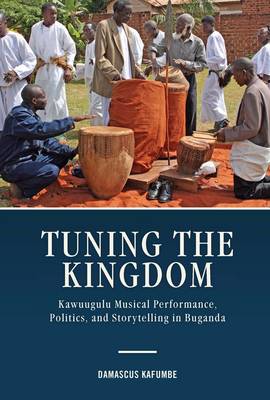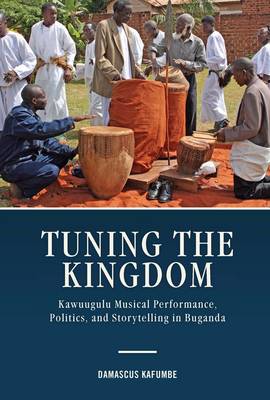
- Afhalen na 1 uur in een winkel met voorraad
- Gratis thuislevering in België vanaf € 30
- Ruim aanbod met 7 miljoen producten
- Afhalen na 1 uur in een winkel met voorraad
- Gratis thuislevering in België vanaf € 30
- Ruim aanbod met 7 miljoen producten
Zoeken
Tuning the Kingdom
Kawuugulu Musical Performance, Politics, and Storytelling in Buganda
Damascus Kafumbe
€ 46,45
+ 92 punten
Omschrijving
Examines how the Kawuugulu Clan-Royal Musical Ensemble uses musical performance and storytelling to manage, structure, model, and legitimize power relations among the Baganda people of south-central Uganda. Tuning the Kingdom draws on oral and written accounts, archival research, and musical analysis to examine how the Kawuugulu Clan-Royal Musical Ensemble of the Kingdom of Buganda (arguably the kingdom's oldest and longest-surviving performance ensemble) has historically managed, structured, modeled, and legitimized power relations among the Baganda people of south-central Uganda. Damascus Kafumbe argues that the ensemble sustains a complex sociopolitical hierarchy, interweaving and maintaining a delicate balance between kin and clan ties and royal prerogatives through musical performance and storytelling that integrates human and nonhuman stories. He describes this phenomenonas "tuning the kingdom," and he compares it to the process of tensioning or stretching Kiganda drums, which are always moving in and out of tune. Even as Kawuugulu continues to adapt to the rapidly changing world around it, Tuning the Kingdom documents how Kawuugulu has historically articulated and embodied principles of the three inextricably related domains that serve as the backbone of Kiganda politics: kinship, clanship, and kingship. Winner of the 2020 Kwabena Nketia Book Prize of the African and African Diasporic Music Section of the Society for Ethnomusicology and Honorable Mention for the 2019 Ogot Book Prize of the African Studies Association Damascus Kafumbe is Assistant Professor of Music at Middlebury College.
Specificaties
Betrokkenen
- Auteur(s):
- Uitgeverij:
Inhoud
- Aantal bladzijden:
- 180
- Taal:
- Engels
- Reeks:
- Reeksnummer:
- nr. 8
Eigenschappen
- Productcode (EAN):
- 9781580469043
- Verschijningsdatum:
- 30/05/2018
- Uitvoering:
- Hardcover
- Formaat:
- Genaaid
- Afmetingen:
- 150 mm x 231 mm
- Gewicht:
- 430 g

Alleen bij Standaard Boekhandel
+ 92 punten op je klantenkaart van Standaard Boekhandel
Beoordelingen
We publiceren alleen reviews die voldoen aan de voorwaarden voor reviews. Bekijk onze voorwaarden voor reviews.











